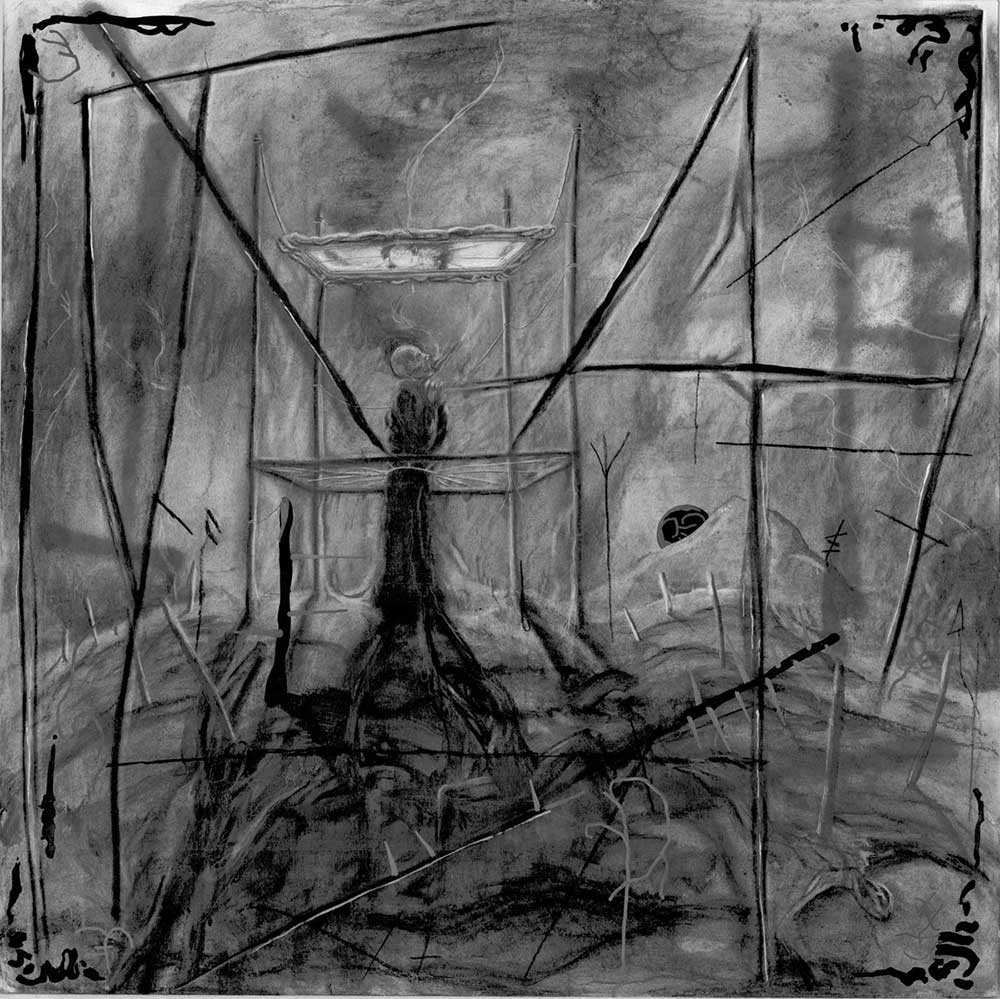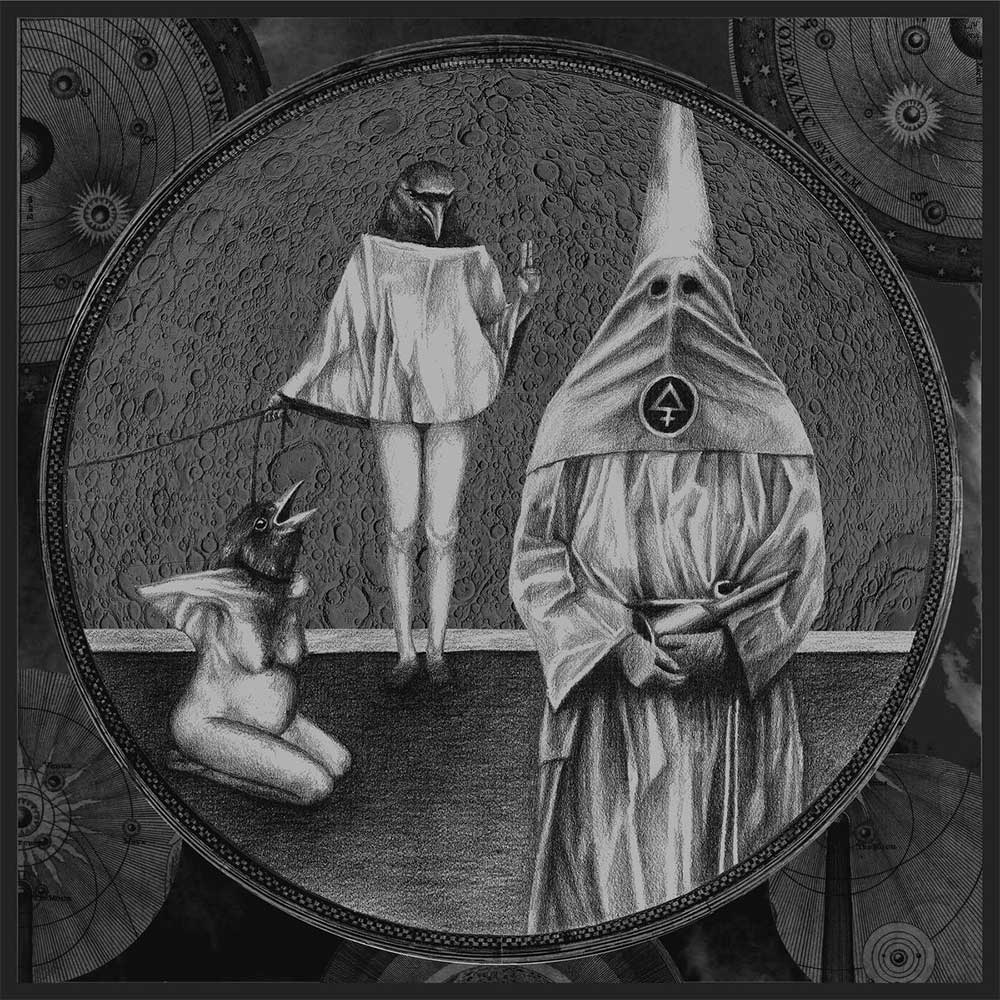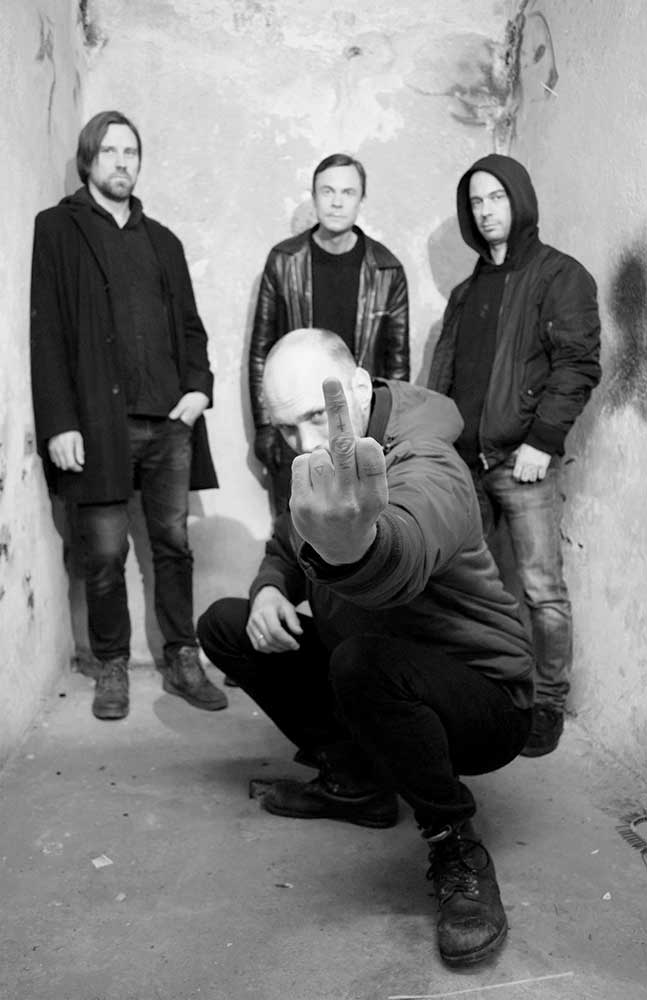Katechon
2019-02-20
by Niklas Göransson
With their new album, “Sanger fra Auschwitz”, Norway’s Katechon severs all ties with their esoteric past and instead focus wholeheartedly on the potential for chaos in the madness of crowds.
– Musically, we were aiming for an album that expresses despair. Not necessarily in a misanthropic or suicidal fashion but rather an overall sense of hopelessness. This time we wanted the usual warmth from the guitars and drums, yet at the same time making them feel as cold as the steel gates of Auschwitz. We sought a full, rich, and textured sound and so added a lot of subtle guitars in the background. There are also plenty of mellotrons and synthesisers incorporated – inaudible for the most part, except for when they suddenly burst out blazing and demand full attention in the soundscape. None of us have spent this much time in the studio on one single album before, and hopefully the extra effort invested is something the audience will appreciate. If not, we’re going back to straightforward song structures.
Now, the choice of album title, “Sanger fra Auschwitz”, is undoubtedly somewhat eye-catching. Reminds me somewhat of the approach taken by KATECHON’s countrymen FORGOTTEN WOODS.
– It was back in early 2017 when I first approached the band with my idea of a concept album focusing on the Holocaust. Most of us aren’t afraid of dealing with sinister themes – at least musically and lyrically – but this one, we agreed, needed to be handled with extreme caution. For me, the biggest fear was being labelled a nazi. I’ve worked with ant-racist groups and been part of the hardcore-punk scene in Norway for over twenty years; I wouldn’t say being anti-nazi is an emblem I wear with pride but, rather, it’s ingrained in my DNA. Any ideology advocating for the seclusion, extermination, or repression of humans on the basis of race, sexuality, gender, or religion is an ideology that needs to be fought back against.

My interviewee, KATECHON vocalist Leif Ottar, mentions that the record itself isn’t preaching in any way; at least not intentionally.
– Obviously, I can’t control the narrative after it’s left my hands – whatever I tried to say is insignificant compared to how the audience perceives it. But, and that’s a big but, whatever you perceive as the intention of an implicit writer doesn’t necessary correlate with those of the actual writer. I approached the subject with caution and respect for anyone whose family or affiliations have been touched by the horrid events of the nazi extermination camps. While no one can claim ownership to any part of history it is of course sensible to conclude that different groups have a stronger attachment to certain parts of history than others. In no way can I claim to feel the same horror as Jews who see synagogues vandalised, set fire to, or bombed by extreme right-wing groups. The Holocaust is without doubt a far more integral part of their history than mine. Therefore, it’s integral to treat the subject matter with the utmost respect. When it comes to writer intentions, I always find it useful to separate between the narrator, the implicit writer, and the actual writer.
In a bid to clarify, Leif explains that the narrator is the voice reciting the lyrics, the implicit writer is the one in control of what’s being said – who asserts intention – while the actual writer, himself in this case, might not even agree with what the aforementioned two are doing.
– Parts of the lyrics, when separated from the rest, even seem to agree with the nazis; however, the overall intentions of the implicit writer would suggest something else entirely. The implicit writer, as much as I try to control him when working on lyrics, could be perceived completely different depending on your social, ethical, moral, and religious identity. When writing I always try to imagine an implicit reader, but totally controlling his or her perception is impossible. I can only attempt to lead you to what I’m trying to say – perhaps failing miserably, which might not even be by mistake. There’s also the question of how you use language. I implement a lot of irony and ambiguity and if listeners lack the means of detecting this then I’d argue that the fault is on them. I don’t think art can ever be totally separated from the artist. Let’s say you see a painting you find interesting, you’ll automatically create an implicit artist which you assign certain values to. It might not even be close to the artist’s own values, but still you do it.
Inspecting KATECHON’s discography, “Sanger fra Auschwitz” doesn’t appear to have been their first such rodeo; I spotted on the cover of their 2013 debut, “Man, God, Giant”, what appears to be one of the original boys in the hood.
– Yes, it is indeed the original boyz n the hood: a catholic wearing a capirote. It was worn to mock arrestees during the inquisition and also by flagellants. They’re still being used to this day, not under directions by the inquisitors, of course, but by some Catholic brotherhoods during religious processions.

Did you have any issues finding a label as a result of your thematic content?
– No, not at all. Saturnal Records sent us a contract offer almost immediately after we split with Nuclear War Now! – just too bad nobody in the band remembered the password for our email account, so we didn’t actually see it until three months later.
It used to be rather effortless for Norwegian underground bands to get a record deal with a decently-sized international label. I get the sense that these days, precarious content aside, this geographical positioning doesn’t carry quite the scene swagger it used to.
– I have no idea, to be honest, but it seems as if it doesn’t matter where you’re from in the underground nowadays. I’d like to say it’s all about the music if you get noticed or not but it is just as important to do the right thing at the right time. Like it always has. The conjunctures are as much part of the underground as before. Had we waited an additional four years before releasing our demo, we might not have been signed on any label.
As a potential topic for conversation, Leif mentioned that KATECHON in past interviews have espoused what he termed as egotistical views of the self in what it means to be a singularity in the collective society, how this can be a strength, and the problems it can cause.
– We’ve said many times before that when humans become masters over themselves as individuals, they manifest what they’re truly meant to be. Something like that. The title of our debut, “Man, God, Giant”, alludes to precisely that. The emphasis has always been on the self; standing against tribalism, a sentiment I still stand by to this day. You should never go on accord with your own personal beliefs but I do believe that one shouldn’t be putting oneself on a pedestal. While humanity can, of course, be difficult to handle a lot of the time, gazing only inwards will not expand your vision. Humans need a moral arch that reaches beyond themselves. So much energy has been invested in debates about negative freedom – you know, rules and laws that hinder humans from being free – but not nearly enough into positive freedom, which is what can help us achieve acceptable levels of purpose, freedom, and satisfaction. Partaking in society and having something outside yourself, a sense of purpose that we collectively work towards, can do wonders for how you feel. Liberation through helping others. For example, and this is a strange one, if I was to propagate and work towards bettering the accessibility for wheelchair users in public buildings and succeeded, I’d feel a lot better than if only doing stuff for myself.
Is that to say you have an inherently altruistic inclination?
– I’d say I’m mainly altruistic. I’ve made the mistake in the past to say very egotistical stuff but have always assumed that the people reading were altruistically inclined to begin with. When I talked about being your own master and such in the past, I meant not to be enslaved by a soulless and unethical group mentality bent on bringing about the destruction of communities and such. Our old guitarist said something poignant once during a debate with some alleged true Norwegian black metallers, ’I’ve lived long enough to know that we all need some kumbaya in our lives.’ And I totally agree. You need some light to the darkness, and you need darkness to the light.

The promo sheet of “Sanger fra Auschwitz” states that KATECHON with this new album ‘kills off the esoteric child diseases they had in their early years and head straightforward into the entropy of collective madness.’ In an interview from 2015 I noted that, ‘Occultism/esoterism is something that arcs over the whole concept of KATECHON, musically as well as lyrically. It’s what ties it all together, it’s the nexus.’ Now, given this nexus business, I’m going to have to assume there was genuine esoteric interest at some point.
– This whole esoteric thing was the domain of our former guitarist, he was really into things like that. Not in a religious or spiritual sense but more of an intellectual journey to explore boundaries and stuff. I sort of just went along, it never meant anything to me – I just thought, ‘Let’s see where this takes me.’ It was like putting on a mask and acting out some sort of play; funny while it lasted but not something that gave me much in return.
What’s next for KATECHON?
– Something less demanding; a year and a half in the studio is a long fucking time! The last time all of us met up, we agreed that our next work should be a catchy, sing-along album at breakneck speed. More in the vein of our demo, but faster. And if we find enough time to rehearse, we might even do some gigs in four-five years or so, haha!



